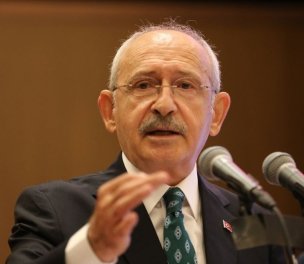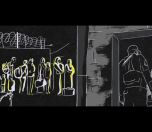* Illustration: Dominika Ożyńska/ Amnesty International
Click to read the article in Turkish / Kurdish
Amnesty International has documented that Syrian security forces have subjected Syrians who returned home after seeking refuge abroad to detention, disappearance and torture, including sexual violence.
In a new report, "You're going to your death," the organization has offered a catalogue of violations committed by the intelligence officers in Syria against 66 returnees, including 13 children.
Among these violations, Amnesty International has documented five cases whereby detainees died in custody after returning to Syria, while the fate of 17 forcibly disappeared people remains unknown.
The organization has noted that "with a number of states, including Denmark, Sweden and Turkey, restricting protection and putting pressure on refugees from Syria to go home, the harrowing testimony in its report is proof that no part of Syria is safe to return to."
Returnees reportedly said that intelligence officers explicitly targeted them for their decision to flee Syria, accusing them of disloyalty or "terrorism."
'Human rights violations have not subsided'
Commenting on the situation, Marie Forestier, the Researcher on Refugee and Migrants Rights at Amnesty International, has said:
"Military hostilities may have subsided, but the Syrian government's propensity for egregious human rights violations has not.
"The torture, enforced disappearances, and arbitrary or unlawful detention which forced many Syrians to seek asylum abroad are as rife as ever in Syria today. What's more, the very fact of having fled Syria is enough to put returnees at risk of being targeted by authorities."
'They must protect Syrian refugees'
Amnesty has emphasized that "any government claiming Syria is now safe is wilfully ignoring the horrific reality on the ground, leaving refugees once again fearing for their lives," briefly saying:
"We are urging European governments to grant refugee status to people from Syria, and immediately halt any practice directly or indirectly forcing people to return to Syria. The governments of Lebanon, Turkey and Jordan must protect Syrian refugees from deportation or any other forcible return, in line with their international obligations."
The report documents human rights violations committed by the Syrian government against refugees who returned from Lebanon, Rukban (an informal settlement between the Jordanian and Syrian borders), France, Germany, Turkey, Jordan and UAE, between mid-2017 and spring 2021, based on interviews with 41 Syrians, including returnees and their relatives and friends, as well as lawyers, humanitarian workers and Syria experts.
Some details from the report are as follows:
'Targeted for fleeing the country'
The authorities have targeted returnees to Syria, accusing those who fled the country of treason or supporting "terrorism".
Amnesty documented 24 cases where men, women and children were targeted as a direct result of these perceptions, and subjected to human rights violations including rape or other forms of sexual violence, arbitrary or unlawful detention, and torture or other ill-treatment.
In some cases returnees were targeted simply because they came from parts of Syria that had been under opposition control.
Sexual violence
Amnesty International documented 14 cases of sexual violence committed by security forces, including seven cases of rape, committed against five women, a teenage boy and a five-year-old girl.
Sexual violence took place at border crossings or in detention centres, during questioning. Testimonies are reportedly consistent with well-documented patterns of sexual violence and rape committed against civilians and detainees during the conflict by pro-government forces.
Torture and enforced disappearance
In total, Amnesty International documented 59 cases of men, women and children who were arbitrarily detained after returning to Syria, most frequently following broad accusations of "terrorism".
In 33 cases, returnees were subjected to torture or other ill-treatment during detention or interrogation.
Intelligence officers reportedly used torture to coerce detainees into confessing to alleged crimes, to punish them for allegedly committing crimes, or to punish them for alleged opposition to the government.
'No part of Syria is safe'
Concluding the report, Amnesty has shared the following observations:
"The level of fighting in Syria has decreased significantly in the past three years, with the Syrian government now controlling more than 70 percent of the country. Against this backdrop, the Syrian authorities have publicly encouraged refugees to return home, while several host countries have begun to reconsider the protection they offer to people from Syria.
"In Lebanon and Turkey, where many refugees face dire living conditions and discrimination, governments have put increasing pressure on Syrians to return.
"In Europe, Denmark and Sweden have reassessed residency permits of asylum-seekers who come from regions they consider safe for return, including Damascus and the surrounding countryside. It is notable however, that a third of the cases documented in this report involve human rights violations that took place in Damascus or the Damascus area.
"Based on the findings in its report, Amnesty International concludes that no part of Syria is safe for returnees to go back to. In addition, people who have left Syria since the beginning of the conflict are at real risk of suffering persecution upon return, on account of perceptions about their political opinions or simply as punishment for having fled the country."
'The reality is different'
Commenting on the situation, Marie Forestier has also said:
"The Assad government has attempted to depict Syria as a country in recovery. The reality is that Syrian authorities are still perpetrating the widespread and systematic human rights violations that contributed to millions of people seeking safety abroad.
"We call on Syrian authorities to ensure the protection of returnees and to end human rights violations against them, as well as ensuring the respect, protection and fulfilment of the human rights of all people in Syria. Countries hosting Syrian refugees must continue to provide refuge, and ensure ongoing protection from the Syrian government's atrocities." (PT/SD)
* Click here for the full report









